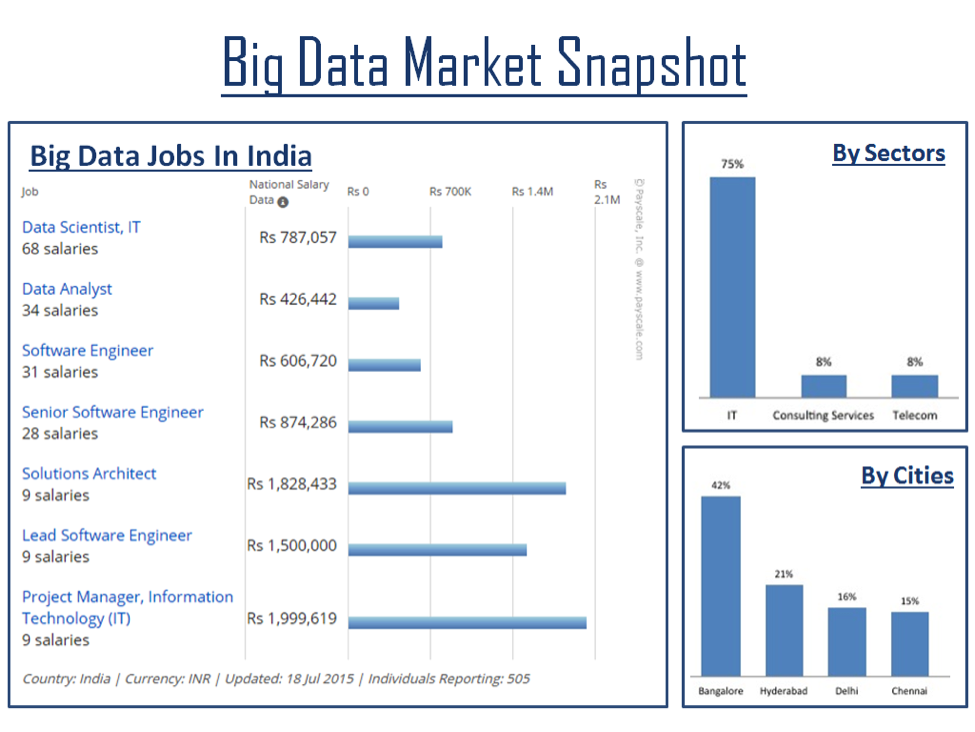Everyone these days are talking about Big data. By definition, Big data is the term used for a collection of data sets so large and loose in structure that it becomes difficult to process using conventional database management tools or traditional data processing applications.
With large amount of data pouring in from a number of different sources at a tremendous pace, it is difficult to collect, process and derive meaningful information from this data. For example, a company would like to know the trend of user’s preference of a particular product and to do a comprehensive study, users data from different sources and formats like social media feeds, blogs, reviews and comments, browser history etc may be collated and analyzed. This requires a specialized role of data scientist who can perform analytics and analytics consultants who can understand and use the data.
All major players in market understand that information is power and are making a concerted effort to recruit, train and integrate people with data skills to enable them to understand and anticipate market trends in order to stay ahead of competition. Companies who aren’t in a tech related industry are also trying to use Big Data to understand their business better and serve their customers well. In fact, Big data capabilities have little to do with company size, IT investment or even the type of business. Any business that relies on consumer data can use the analytics for business intelligence and decision making. Companies have started not just using information for a specific task, such as analyzing quarterly sales numbers together to generate market projections, but thinking about data as a resource in its own right.
Growth in Big Data provides an excellent opportunity for database professionals in India and worldwide. World’s leading information technology research and advisory company Gartner predicted that there will be a demand for 4.4 million big data jobs by 2015 worldwide, 1.9 million of those positions being created in the United States. A similar report was published by McKinsey but with a red flag that there will be a shortage of 140,000-190,000 data scientists and a deficit of 1.5 million managers who are capable of utilizing data driven insights.
With more and more companies realizing the potential of Big Data, demand for Computer Systems Analysts with big data expertise in USA increased 89.9% in the last twelve months, and 85.40% for Computer and Information Research Scientists. Similarly, demand for Python programming expertise increased 96.9% in big-data related positions in the last twelve months. Although Research, Scientific and Technical Services led the market with 27.14% jobs, Information Technologies, Manufacturing and Retail Trade followed with 18.89%, 12.35% and 9.62% respectively.
Xebia Training which offers Big Data Trainings is an official training partner of Cloudera, the leader in Apache Hadoop-based software and services. It has got Professional Instructor like Bhavuk Chawla who is a Software Architect with an exceptional history and more than a decade hands on experience in leading IT projects involving complex functional as well as non-functional requirements.Xebia Training is a goto place for all your training needs for these skills.
If you’re looking for a big data job, here are some skills that could help you in getting a job offer in 2015.
- Apache Hadoop
Hadoop has become synonymous with Big Data and the distributed storage and processing architecture is sure to increase its popularity even further. Offering a comprehensive stack of tools like HDFS, MapReduce, Flume, Oozie, Hive, Pig, HBase, and YARN, Hadoop professionals are bound to be in high demand.
- Apache Spark
Often seen as a faster and simpler alternative to MapReduce style analytics, Spark requires technical expertise to program and run, thereby providing job opportunities for those with the knowledge and experience.
- NoSQL
The high-performance, agile processing of information at massive scale allows NoSQL databases to be scalable and has been the solution to handling some of the biggest data warehouses on the planet – i.e. the likes of Google, Amazon, and the CIA. As the trend catches up, more and more companies are looking for NoSQL experts.
- Data Mining
Analyzing data from different perspectives and summarizing it into useful information is at core of Big data as that is how information is converted into knowledge about historical patterns and future trends. Jobs in data mining, data warehousing and analysis are expected to multiply many folds in next few years.
- Data Visualization
With the rise in demand for data scientists, demand for UI experts has also gone up to render the data in meaningful format to the users. Most business intelligence software vendors hire UI experts to create data visualization tools integrated into their products and help users “see” data in order to help them better understand the information and put it in a business context.
- General Purpose Programming Languages
Programming languages like Python and R are perfect tools for prototyping and building small and reusable systems using Big Data. Some people argue that Big Data needs a new language in its own, but till then general purpose programming languages that support big data will be in demand.
Let me know in the comments below if you need any consulting. , i would be happy to help!





